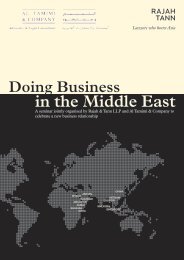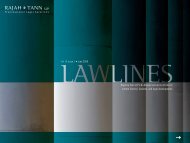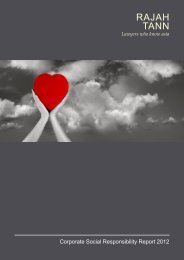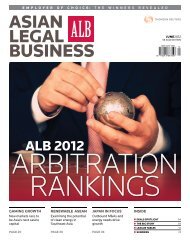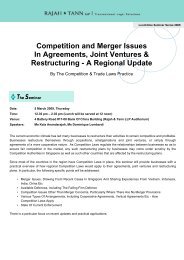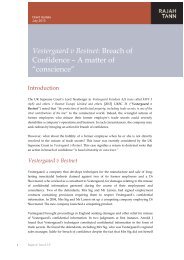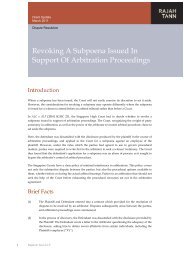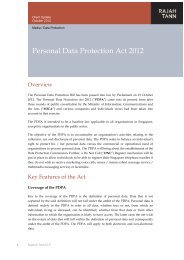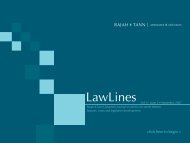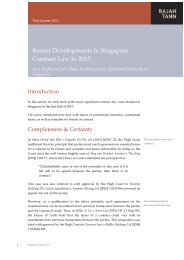Lawlines Volume 9 Issue 4 - eOASIS
Lawlines Volume 9 Issue 4 - eOASIS
Lawlines Volume 9 Issue 4 - eOASIS
Create successful ePaper yourself
Turn your PDF publications into a flip-book with our unique Google optimized e-Paper software.
LawLinesVol 9 . <strong>Issue</strong> 4 • December 2007Around Rajah & TannRound Up – 2007 InPerspectiveFeature ArticlesTo Withhold Or Not ToWithhold – That Is TheQuestionAll Abuzz About GamesCorporate SocialResponsibility UnderThe New IndonesianCompany LawCase BitesLegislation Bitesa competing business confl icted with his fi duciaryduty or obligation of fi delity depended on the actualfacts of any particular case. The Court found thatfrom the time the defendants contacted the lawyersin August 2003, they had formed the irrevocableintention to launch their own business and thus,they were obliged to disclose to the claimants theactual and threatened activity to set up a competingbusiness. From then on, there was a plain confl ictbetween their personal interest and the businessinterests of the claimants.Explanatory Materials Failed To ExplainTransaction For Which Shareholders’Approval SoughtIn ENT Pty Ltd v Sunraysia Television Ltd (2007),the Supreme Court of New South Wales had todetermine whether to grant an application for aninjunction by the plaintiff shareholder to restrain thecompany from holding a shareholders’ meeting. Themeeting was held to seek shareholders’ approvalof the sale of the shares held by the company inits subsidiary to another party. The plaintiff allegedthat the directors breached their fi duciary duty of fulland fair disclosure to their shareholders, in that thedocumentary disclosure that had been made wasinadequate to enable the shareholders to make aproperly informed judgment on the sale.The Court held that the shareholders requiredmaterial so they could assess whether the sale isat a fair price and whether the terms of the sale areonerous or disadvantageous and how and whenthe shareholders will benefi t from the proceeds ofsale, in terms of the distribution of the benefi t andtax effect of the distribution.Since the material provided by the company failedto supply basic information on these matters, theCourt concluded that there was a strong groundfor supposing that the defi ciencies would causethe shareholders to vote, or abstain from votingunder a serious misapprehension of the position.Accordingly, the Court granted the injunction.De Facto DirectorsIn Primlake Ltd v Matthews Associates (2007),the English High Court had to determine whethera person, M, was to be regarded as a de factodirector of a company, P. The allegation was thatM had requested R, a director of P, to authorisepayments by P to M. The overwhelming evidencebefore the Court was that R allowed M to performpage 29 of 44 pages | print | comments | close



